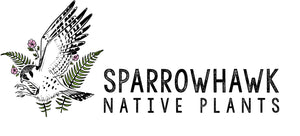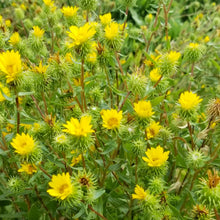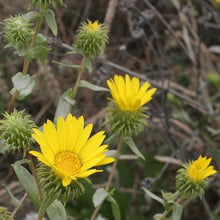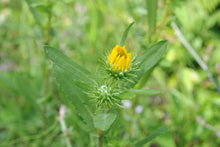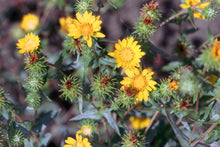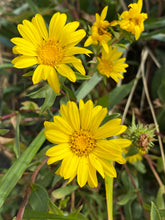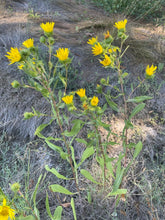
Grindelia integrifolia
Willamette valley gumweed, also known as Puget Sound gumplant, is a stout plant, standing up to four feet tall, with showy, yellow flowers that are coveted by native butterflies, bees, syrphid flies, wasps and other beneficial insects. It's one of the few native wildflowers that bloom in late summer and even fall, making it an important late-season source of pollen.
- Plant type/canopy layer: deciduous, perennial, herbaceous plant
- Size at maturity: 36-48” tall, 12-18” wide
- Light requirements: full sun to part shade
- Moisture requirements: dry to wet soil (pretty much any soil!)
- Growth rate/ease: moderate growth rate, easy to grow
- Bloom time: June - September - but occasionally as late as Oct
- Wildlife support: flowers are an important late-season source of pollen and nectar for butterflies, native bees, syrphid flies, wasps and other beneficial insects; seeds provide food for birds
- Native habitat/range: grows in freshwater and saltwater marshes, wet meadows, rocky areas along the coast, coastal headlands and bluffs, and various other non-maritime habitats, from sea-level to 300m, from western British Columbia south through western Washington and Oregon, including the Willamette Valley. Portland Plant List – yes.
- Special features & uses: drought tolerant; beneficial insect and pollinator favorite; medicinally dried leaves and flowering tops are antiasthmatic, anti-inflammatory, antispasmodic, expectorant and sedative, as such this plant has been traditionally used by indigenous people to treat asthma, cough, bronchitis and skin afflictions like poison ivy, and continues to be used in herbalism today (always seek advice from a professional before using a plant medicinally. Sparrowhawk can not take any responsibility for any adverse effects from the use of plants); landscape uses include raingardens, meadowscapes and pollinator gardens
Gardening with Willamette Valley Gumweed: Hardy, drought tolerant and easy to grow - this plant is an excellent addition for sunny pollinator meadows. It often acts as a biennial; displaying low clumps of gummy leaves in the first year and tall stems that rise with plentiful late summer blooms in the second. The tall stems often bend and fall over as flowers bloom, so it works well when densely planted among other wildflowers and grasses that can help prop it up and give the impression that its bright yellow blooms are floating throughout the meadow in late summer. Will self sow if the conditions are right.
Seeding Instructions: If direct sowing, do so in fall as this species usually has a fair amount of seed dormancy. Seeds usually need 45-90 days of cold moist chilling at 35-40 degrees before they will germinate in spring. Alternatively, sow seeds in containers and place outdoors in or in a cold frame in February. Seeds should germinate as temperatures rise in late March.
Photo Credit 1: "Grindelia integrifolia" by Gail is licensed under CC BY 4.0.
Photo Credit 2: Willamette Wildlings
Photo Credit 3: "Grindelia integrifolia - Puget Sound gumweed" by Joost J. Bakker IJmuiden is licensed under CC BY 2.0.
Photo Credit 4: "Grindelia integrifolia" by BLM Oregon & Washington is licensed under CC BY-SA 2.0.
Photo Credit 5: "Grindelia integrifolia" by John Leszczynski is licensed under CC BY 4.0.
Photo Credit 6: iNaturalist © Matt Berger, some rights reserved (CC-BY)
